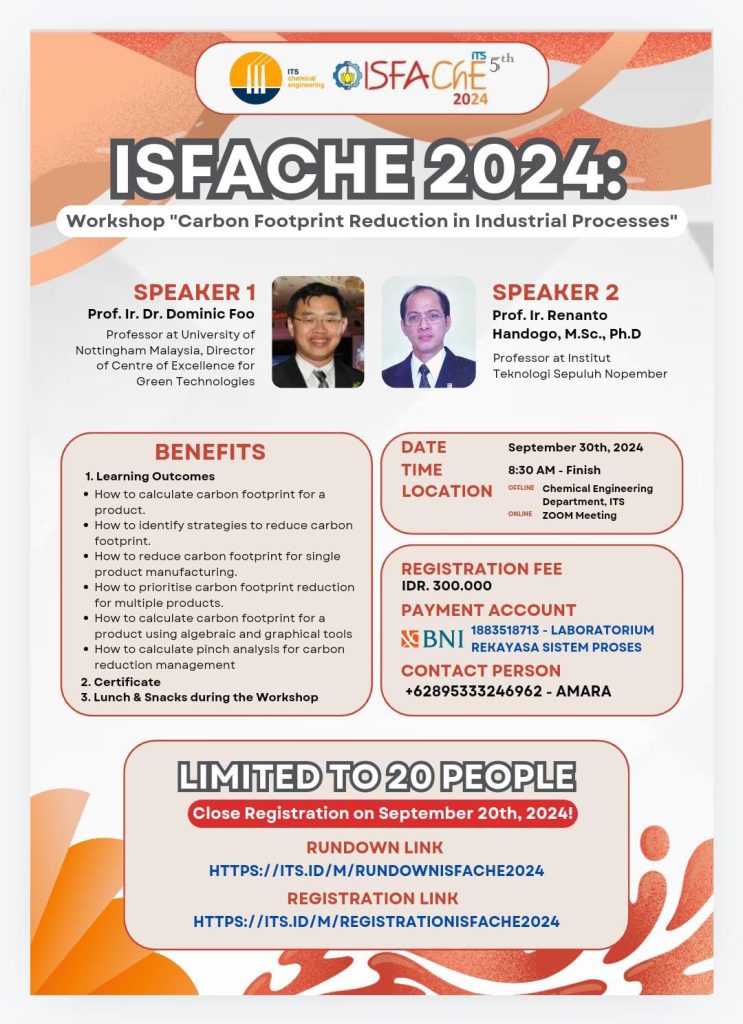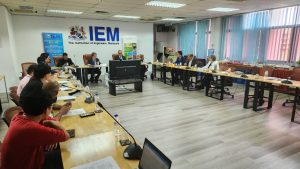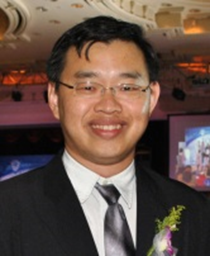As part of International Seminar on Fundamental and Application of Chemical Engineering (ISFAChE) 2024, a workshop with a title of “Carbon Footprint Reduction in Industrial Processes” will be held at
📍: Department of Chemical Engineering ITS
📅 : Monday, September 30th, 2024
⏰ : 08.30 WIB – finish
With notable speakers:
1. Prof. Ir. Dr. Dominic Foo (Professor at University of Nottingham Malaysia)
2. Prof. Ir. Renanto Handogo, M. Sc., Ph.D (Professor at Institut Teknologi Sepuluh Nopember)
Registration fee: Rp300.000
REGISTRATION LINK :
https://its.id/m/REGISTRATIONISFACHE2024
RUNDOWN LINK :
HTTPS://ITS.ID/M/RUNDOWNISFACHE2024
❗Limited to only 20 people
For more information, please contact Amara: +62895333246962 (WhatsApp)”

 Learning outcomes
Learning outcomes
| Day 1 | Content |
| 8:30 am – 9:00 am | Registration |
| 9:00 am – 9:40 am | Session 1 – Introduction: Climate change, carbon footprints, and implications for industry |
| 9.40 am – 10.00 am | Session 2 – Generic methods for carbon footprint reduction with graphical technique |
| 9:40 am – 10:00 am | Break |
| 10:00 am – 12:15 am | Session 3 – Industrial case studies Case study 1 – biochemical production Case study 2 – chlor-alkali production |
| 12:15 pm – 1:30 pm | Lunch |
| 1:30 pm – 3:00 pm | Session 3 (continued) Case study 3 – palm oil refinery |
| 3:00 pm – 3:30 pm | Break |
| 3:30 pm – 4:45 pm | Session 4 – carbon footprint reduction for multiple products Case study 4 – syngas and dry pulp production |
 Professor Ir. Dr. Dominic Foo is a Professor of Process Design and Integration at the University of Nottingham Malaysia, and is the Founding Director for the Centre of Excellence for Green Technologies. He is a Fellow of the Institution of Chemical Engineers (IChemE), Fellow of the Institution of Engineers Malaysia (IEM), a Fellow of the Academy of Sciences Malaysia (ASM), a Chartered Engineer (CEng) with the Engineering Council UK, a Professional Engineer (PEng) with the Board of Engineer Malaysia (BEM), as well as the Past President for the Asia Pacific Confederation of Chemical Engineering (APCChE). Professor Foo is an active author, with 10 books, more than 220 journal papers and made more than 230 conference presentations, with more than 40 keynote/plenary speeches. Professor Foo is the Editor-in-Chief for Process Integration and Optimization for Sustainability (Springer Nature), Subject Editor for Process Safety & Environmental Protection (Elsevier), and editorial board members for several other renowned journals. He is the winners of the Innovator of the Year Award 2009 of IChemE, Young Engineer Award 2010 of IEM, Outstanding Young Malaysian Award 2012 of Junior Chamber International (JCI), Outstanding Asian Researcher and Engineer 2013 (Society of Chemical Engineers, Japan), and Top Research Scientist Malaysia 2016 (ASM). He is ranked in the “Stanford List” among the top 2% of the world’s scientists. He conducted close to 100 professional workshops to academics and industrial practitioners worldwide, including in UK, Australia, South Korea, South Africa, etc.
Professor Ir. Dr. Dominic Foo is a Professor of Process Design and Integration at the University of Nottingham Malaysia, and is the Founding Director for the Centre of Excellence for Green Technologies. He is a Fellow of the Institution of Chemical Engineers (IChemE), Fellow of the Institution of Engineers Malaysia (IEM), a Fellow of the Academy of Sciences Malaysia (ASM), a Chartered Engineer (CEng) with the Engineering Council UK, a Professional Engineer (PEng) with the Board of Engineer Malaysia (BEM), as well as the Past President for the Asia Pacific Confederation of Chemical Engineering (APCChE). Professor Foo is an active author, with 10 books, more than 220 journal papers and made more than 230 conference presentations, with more than 40 keynote/plenary speeches. Professor Foo is the Editor-in-Chief for Process Integration and Optimization for Sustainability (Springer Nature), Subject Editor for Process Safety & Environmental Protection (Elsevier), and editorial board members for several other renowned journals. He is the winners of the Innovator of the Year Award 2009 of IChemE, Young Engineer Award 2010 of IEM, Outstanding Young Malaysian Award 2012 of Junior Chamber International (JCI), Outstanding Asian Researcher and Engineer 2013 (Society of Chemical Engineers, Japan), and Top Research Scientist Malaysia 2016 (ASM). He is ranked in the “Stanford List” among the top 2% of the world’s scientists. He conducted close to 100 professional workshops to academics and industrial practitioners worldwide, including in UK, Australia, South Korea, South Africa, etc. 
Moh. Irwan Fatkhur Rozy (+628 1233 932 352)
Badril Azhar (+628 5132 545 861)
Email : isfacheits@its.ac.id
Chemical Engineering Department
Institut Teknologi Sepuluh Nopember
Surabaya, East Java Indonesia
Copyright ISFAChE. 2024 – All Rights Reserved